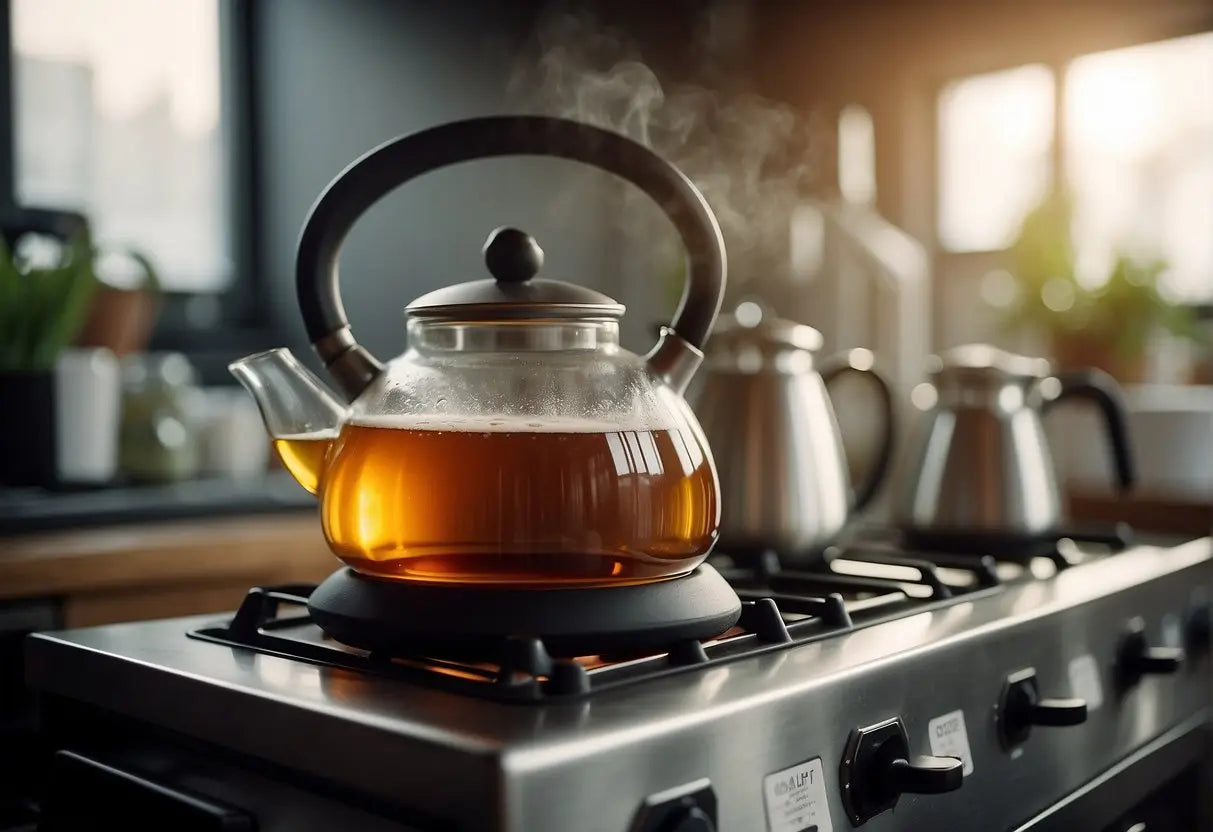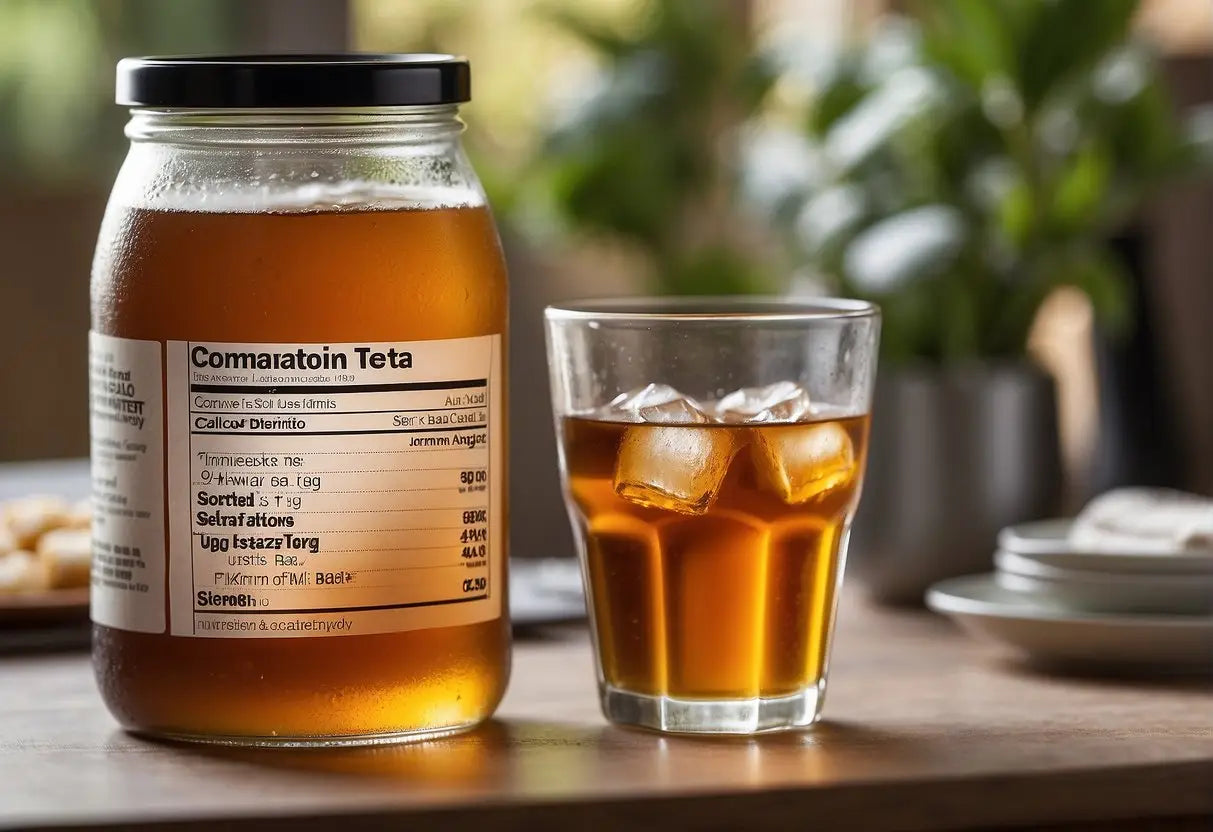How Many Calories Are in Unsweet Tea
Shop our Pu Erh Tea collections!
When you drink unsweetened tea, you're consuming a beverage that contains a negligible amount of calories. Typically, a cup of unsweet tea has less than 5 calories. These trace calories originate from the minimal residual natural oils and flavonoids found in the tea leaves.
Here is a breakdown of the caloric content in unsweet tea:
Bestsellers
| Quantity | Approximate Calories |
|---|---|
| 1 cup (240 ml) | 0 - 2 |
| 1 pint (473 ml) | 0 - 4 |
| 1 quart (946 ml) | 0 - 8 |
Remember, these values can vary slightly depending on the specific type of tea leaf you choose. However, for all practical purposes, unsweet tea can be considered a calorie-free drink, which makes it an excellent choice for those of you looking to maintain or reduce your caloric intake.
It's important to note that adding any sweeteners or flavorings to your tea will increase the calorie count. To keep your tea low in calories, you should avoid mixing in sugar, honey, syrups, or cream.
Unsweet tea is a versatile beverage that can be enjoyed hot or cold, and because of its minimal calorie content, it fits well into various dietary plans. So, when you're looking for a hydrating drink that won't contribute to your daily calorie intake, unsweet tea is a reliable option.
Ingredients in Unsweet Tea

When you prepare unsweet tea, you are essentially brewing a simple mixture with only a couple of key components. Your typical unsweet tea will include:
- Water: The base of unsweet tea, acting as the solvent for extracting flavors.
- Tea Leaves: The primary source of flavor, which can be from varying types of tea such as black, green, or herbal teas.
- Heat the water to the appropriate temperature depending on the type of tea leaves you are using.
- Steep the tea leaves or a tea bag in hot water for the recommended duration.
Ingredient Variations:
Although the basic ingredients in unsweet tea are water and tea leaves, you might find additional elements in different versions of the drink:
- Optional Flavorings: Some prefer to add natural flavors like lemon slices or herbs like mint for a refreshing twist, without adding calories.
- Types of Tea: The choice of tea leaves (e.g., black, oolong, white, green, or herbal) will influence the flavor but not the calorie count significantly.
No sugars or sweeteners are added to unsweet tea, which makes it a calorie-free beverage. Keep in mind that the addition of any sweeteners or milk will alter the calorie content. Enjoy your unsweet tea knowing that, in its basic form, it's a simple, calorie-free drink that can be a pleasant part of your daily routine.
Brewing Methods and Calorie Variation

When you brew tea, the calorie content largely remains unaffected by the method you choose, as unsweetened tea itself is virtually calorie-free. The essential ingredient in tea, the tea leaves, contain only a negligible amount of calories that, when brewed, do not substantially contribute to your caloric intake.
Hot Brew (Steeping):
Lao Ban Zhang
- Boiling water: 0 calories
- Tea leaves (per cup): 2-5 calories
Cold Brew:
- Cold water: 0 calories
- Tea leaves (per cup): 2-5 calories
The caloric difference between methods like hot brewing and cold brewing is minimal. A cup of unsweet tea, whether hot or cold brewed, typically contains between 2 to 5 calories. This variation is due to the type of tea leaf you choose and the steeping time. For instance:
- Green tea: Lighter brews may contain closer to 2 calories.
- Black tea: Longer steep times might have up to 5 calories.
For flavored or herbal teas, be sure to check the packaging, as some might contain added ingredients that increase the calorie count.
Embedded Ingredients:
Some tea blends might come with additional ingredients such as:
- Dried fruits: These can add minimal calories per cup.
- Added flavors: Usually calorie-free, but verify on packaging.
Remember, the addition of sweeteners, milk, or cream will significantly alter the calorie content. If you wish to keep your tea low-calorie, enjoy it plain and avoid adding any extra ingredients.
Comparative Caloric Analysis

When you choose to drink unsweet tea, you are opting for a beverage that is remarkably low in calories. Unsweet tea essentially contains zero calories. This is because it is simply water infused with the flavors of tea leaves, without any added sugars or sweeteners.
Plain Unsweet Tea:
- Calories: 0-2 per 8 oz
However, if you decide to add sweeteners or flavorings, the caloric content will increase accordingly.
Add-Ins:
- Sugar (1 teaspoon): +16 calories
- Honey (1 tablespoon): +64 calories
- Lemon Juice (1 tablespoon): +4 calories
It's important to note that while unsweet tea itself is calorie-free, additional ingredients can significantly alter its nutritional profile. Here's a quick comparison to give you perspective on how unsweet tea stands against other common beverages:
| Beverage | Calories per 8 oz |
|---|---|
| Unsweet Tea | 0-2 |
| Soda | 100-150 |
| Fruit Juice | 60-120 |
| Sweet Tea | 90-100 |
| Coffee (black) | 2-5 |
Choosing unsweet tea over calorie-dense drinks can be a smart move for managing your dietary intake, especially if you’re mindful of your overall calorie consumption. Remember, the key to enjoying unsweet tea without the added calories lies in resisting the urge to add sweeteners.
Health Considerations

When considering the calorie content of unsweet tea, it's important to note that unsweet tea in its pure form essentially contains zero calories. This means that for those of you monitoring your calorie intake, unsweet tea can be a hydrating choice without affecting your daily caloric budget.
The lack of sugar in unsweet tea makes it a suitable drink if you are managing conditions like diabetes or are aiming to reduce sugar consumption for overall wellness. Since there are no added sugars, you won't experience the blood sugar spikes associated with sweetened beverages.
Furthermore, unsweet tea provides you with antioxidants known as polyphenols which may support heart health and reduce inflammation. Keep in mind that adding any sweeteners or flavors will alter the calorie count, so it's advisable to check labels when purchasing pre-packaged teas or ordering at a cafe.
It's also good to be aware that caffeine is present in unsweet tea. The caffeine content in tea can vary but is typically less than coffee. If you're sensitive to caffeine or have been advised to limit your intake, consider the amount of unsweet tea you consume throughout the day.
In summary, unsweet tea can be a favorable beverage choice from a calorie standpoint. Yet, remember to consider the potential impacts of caffeine and any extra ingredients that might be added beyond the basic brewed tea leaves and water.
Measurement Variations and Serving Sizes

When considering the calorie content of unsweet tea, it's vital to understand that the number of calories can vary depending on the serving size and any additional ingredients you may add. Unsweet tea by itself essentially contains zero calories. However, serving sizes can greatly impact this value.
Typically, a standard serving size of unsweet tea is 8 ounces (240 milliliters). In this quantity, you’d be consuming virtually no calories unless you decide to add sweeteners or flavorings. Below is a breakdown of common serving sizes and their respective calorie counts:
| Serving Size | Calories (approx.) |
|---|---|
| 8 oz (1 cup) | 0 |
| 16 oz | 0 |
| 32 oz | 0 |
Remember, these values apply to plain unsweet tea without additives. If you prefer a larger cup or if you’re served a different amount at a restaurant, simply scale these numbers accordingly. For instance, a 16-ounce glass contains double the volume of an 8-ounce serving, but the calorie count remains the same at zero.
Be mindful of any extras you include. Lemons, sweeteners, or flavor syrups will increase the calorie content. For precise calorie tracking, always check the nutritional information of the additives you use. Remember, the purity of your unsweet tea is what keeps it virtually calorie-free.
Label Reading and Nutrition Facts
When examining the nutrition facts on an unsweet tea bottle, focus on the calorie content. Unsweetened tea typically contains negligible calories, usually less than 5 calories per serving. Manufacturers are not required to list calories if they fall below this threshold.
Ingredients List:
- Tea (green, black, etc.)
- Water
Nutrition Facts:
- Calories: Generally 0-5
- Total Fat: 0g
- Sodium: 0mg
-
Total Carbohydrates: 0g
- Dietary Fiber: 0g
- Sugars: 0g
- Protein: 0g
Remember, the absence of calories in unsweet tea means it can be a suitable drink for weight management. Always verify serving sizes on the label to ensure you're consuming the expected amount.
Frequently Asked Questions
This section aims to answer your common queries regarding the calorie content of unsweet tea and its variations.
What is the caloric content of a cup of unsweetened iced tea?
A typical 8-ounce (240-milliliter) serving of unsweetened iced tea contains 0 to 2 calories, as it is simply brewed tea without any added sugars or sweeteners.
How does adding milk to unsweetened tea affect its calorie count?
If you add milk to your cup of unsweetened tea, the calorie count increases depending on the type and amount of milk used. For example, one tablespoon (15 milliliters) of whole milk adds approximately 9 calories.
What is the calorie comparison between sweetened and unsweetened tea?
Sweetened tea can contain a significant amount of calories based on the type and amount of sweetener used. Unsweetened tea has virtually no calories, whereas a cup of sweetened tea can have anywhere from 70 to over 100 calories.
Can drinking unsweetened tea contribute to weight loss?
Drinking unsweetened tea may contribute to a caloric deficit if it replaces higher-calorie beverages in your diet, which could potentially support weight loss.
What are the nutritional differences between fast-food unsweetened tea and homemade?
Fast-food unsweetened tea may contain additional calories from the type of tea used or added flavors. Homemade unsweetened tea typically has fewer ingredients and a more straightforward nutritional profile with minimal to no calories.
How do the calories in unsweetened tea compare to other flavored iced teas?
Other flavored iced teas, such as those with fruit flavors or sweeteners, have more calories than plain unsweetened tea. The specific calorie content can vary widely depending on the brand and ingredients used.
← Older post Newer post →











